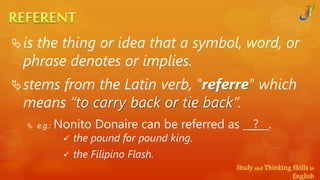English 101. Antecedent & Referent
- 2. ïis the noun or noun phrase that a pronoun refers to. ïcame from the Latin word âanteâ, meaning, "before" ïe.g., I'll give this to Mary if I see her. ïŒ"Mary" is the antecedent of "her" in the sentence.
- 3. ïis a word or phrase that a subsequent word refers to. ïe.g.: Dogs are dangerous if they bite. ïŒ The antecedent is the word that the pronoun is about. ïŒ âtheyâ is the pronoun. ïŒ âDogsâ is the antecedent. ïŒ A pronoun must always agree with its antecedent.
- 4. ïis the thing or idea that a symbol, word, or phrase denotes or implies. ïstems from the Latin verb, "referre" which means âto carry back or tie backâ. ï e.g.: Nonito Donaire can be referred as ? . ïŒ the pound for pound king. ïŒ the Filipino Flash.
- 5. ï e.g.: Jose Rizal is known as ? . ïŒ Pepe. ïŒ Balagtas. ïŒ the National Hero. ï e.g.: Dr. Bruce Banner has an âalter egoâ known as ? . ïŒ the Hulk, the Incredible Hulk, the green monster. ï e.g.: JesusâŠ ïŒ the Messiah, Christ, Rabbi, the Savior, the Redeemer, the Son of man, the Son of God, the Lamb, the Shepherd, etc.
Editor's Notes
- Parts of Speech, words classified according to their functions in sentences, for purposes of traditional grammatical analysis. Eight parts of speech are usually identified: nouns, adjectives, adverbs, prepositions, conjunctions, pronouns, verbs, and interjections. Most of the major language groups spoken today, notably the Indo-European languages and Semitic languages, use almost the identical categories; Chinese, however, has fewer parts of speech than English.
- Despite the implications of the term (Latin ante- means "before"), "an antecedent can follow rather than precede. eg.: For his first class, the teacher has to prepare well. Masculine - James cleaned his car. Feminine - Susan took her dog for a walk. Neutral - The clouds have changed their direction. Singular - The student carried his book. Plural - The students carried their books.
- REFERENTS are the words used to represent things and experiences in the real or imagined world. Different words can be used to describe the same thing or experience. REFERENT is the concrete object, concept, action, state, relationship, or attribute that is designated by a word or expression.
- The obvious difference between the two is: An âantecedentâ is a noun that has to be referred by its corresponding (possessive) pronoun, whereas A âreferentâ is a (proper) noun that tends to have several correspondents or descriptions expressed as other noun or noun phrase.






